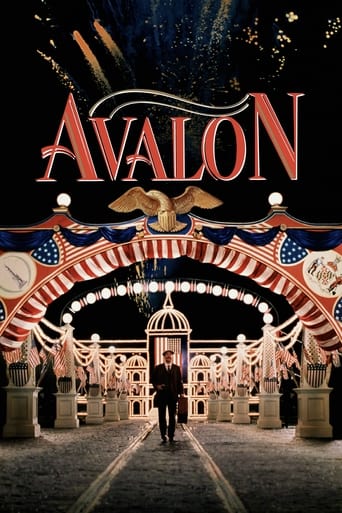kosmasp
As quite a few people have pointed out, this will especially appeal to people who migrated to other countries. It doesn't have to be the USA, it could be the people who came to Germany after the second world war or other countries. With Armin M. Stahl you have a heavyweight actor, but you also get Elijah Wood as a kid. Who knows if someone thought he'd become famous like that, back then? The title of course is a clue in itself, but the movie is nicely paced drama. I only watched it this year (at the Berlin International Festival) but I think the impact the movie has, still works. It didn't lose anything over the years. Hopefully you are in the right state of mind, while watching it
filmbay
On paper, writer-director Barry Levinson's semi-autobiographical Avalon, which begins with the arrival of Polish Jew Sam Krichinsky (Armin Mueller- Stahl) in the Avalon area of Baltimore, Md., on July 4, 1914, and ends when he is in his dotage on another July 4 sometime in the sixties, is an intellectually crystalline epic about the demise of the extended family, the erosion of traditional American and European values, the growth of alienated suburban culture (organized around television) and the hegemony of materialism.That's on paper. On screen, Avalon is unconscionably sloppy (the leaves of deciduous trees in Baltimore at Christmas are green on one block, yellow on another and non-existent on a third), structurally amorphous (the movie could end at any time or go on forever, which it seems to do), and gummily sentimental (grandparents and children are psychologically saintly). The lovely moments and fine performances in the picture can't redeem Levinson's technical carelessness - the editing is without rhythm, momentum, or even logic - nor can they compensate for Avalon's ethnographic toothlessness: imagine Mordecai Richler without the bite.Levinson would have made Duddy Kravitz a mensch.Avalon is more irritating than most ambitious failures because Levinson, winner of the best directing Oscar in 1988 for Rain Man, is wildly talented, and his two earlier semi-autobiographical films set in Baltimore, Diner and Tin Men, were twin peaks of Proustian purity. Structured lightly but soundly, in the esthetic version of aluminum, they vaulted over the twin valleys of bathos, sentimentality and nostalgia.Avalon is a bridge made of lead.But students of performance will want to see it for a quartet of reasons. The first is Armin Mueller-Stahl, the East German actor who came West in the late seventies and has not been within spitting distance of mediocrity since, whether as the tortured politician in Rainer Werner Fassbinder's Lola, the complex farmer in Angry Harvest or Jessica Lange's mysterious father in Music Box. As written, Avalon's Sam Krichinsky is fundamentally a grandchild's adoring projection of a grandfather, but Mueller-Stahl's Prussian blue eyes bespeak more depth than the character is permitted to articulate; when the script does become bluntly pedantic, Mueller-Stahl subtly softens the blows. Sadly, even this great actor is done in at the end when he is plastered with outrageously inept old-age makeup. He looks like nothing less than a blue-eyed, Teutonic E.T. about to sing a geriatric variation of Cabaret's Nazi hymn, Tomorrow Belongs to Me: Yesterday Vas Mine.The second extraordinary actor is Joan Plowright, the British widow of Laurence Olivier; she plays Eva Krichinsky, Sam's Polish-American wife, with a flawless accent, as if she had not done Shakespeare, Chekhov, John Osborne or Peter Greenaway, all of whom she has, of course, enlivened. But technique aside, she follows Mueller-Stahl in toughening up the soft edges and in softening the rough edges of a character verging on caricature; while certainly Jewish, her meddling mother-cum-grandmother is no stage- bound Jewish mother.The most fully dramatized conflict in Avalon involves the grandparents and their relationship to their son Jules and his wife Ann (and eventually to the young couple's children), all of whom live together. Aidan Quinn, as the cautious and contemplative Jules, and Elizabeth Perkins, as the fun-loving but responsible Ann, complete the foursome of exceptional performances: he infuses an introvert with exterior life and she captures the spirit of femininity in the fifties with eerie exactitude, as if Life had come to life (it's an asset that she looks like the Judy Garland of that period).Four fabulous musicians, less than fabulous music for them to play: the resonant sequences (an on-going Thanksgiving argument, for example) are regularly intercut with comic schtick, the most egregious instance being the purchase of a television set - would people interested enough in TV to buy one not know that during the day there were no programs? The purchasers sit in front of the box, watch the test pattern, get disgusted, and leave it to the kids. It's a funny bit, but it's fraudulent, and it corrodes Avalon, which is trying to do something new, with the stuff of deja-vu. There are two lines delivered by Eva that express the irritation Avalon engenders: "How many times do we have to hear this story? We all heard it before." Benjamin MIller, Filmbay Editor
Tom
Although this film takes place 15 years before I was born, growing up in an ethnic family in the early 60's had changed very little.My family is Greek, but this film will appeal to any ethnic group especially first or second generation Americans. Back then we all still gathered at one member's home for holidays and on Sundays. We all dressed up (and still do) for church and holiday gatherings. Watching little Elijah Wood with his bow tie reminded me of myself at that age.Mr. Levinson through film, and Randy Newman through his haunting musical score did a magnificent job of recreating a world that has all but disappeared. A time when family was the center of our lives, children respected the adults and were expected to behave in a civilized manner, people didn't spend Sundays running all over town to football, soccer games etc, and the elder members of the family were revered instead of ignored or worse, placed in a home.We, those of us in the post-war generation would to well to look at this film as a guideline for how to bring values back into our lives and realize that we all need to re-think our priorities.If you want to relive your childhood for 2 1/2 hours laugh one minute and cry the next, I HIGHLY recommend this film




